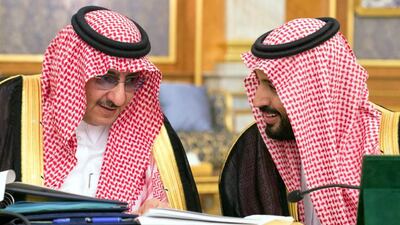JEDDAH // Saudi Arabia plans to develop its arts and media industry to counter negative stereotypes of the kingdom, which has no public cinema or theatre.
The initiatives are part of the wide-ranging National Transformation Programme (NTP) which sets five-year targets for diversifying the oil-dependent economy.
“The intention also is to transform the society,” said culture and information minister Adel Al Turaifi on Tuesday, a day after the NTP was endorsed by the Saudi cabinet.
While private film showings and small art exhibitions had occurred in Saudi Arabia, the Wahhabist movement on which the kingdom is founded forbids paintings of the human form and frowns upon music.
Under the NTP, a Royal Arts Complex would be developed, as well as a Media City.
Ahmed AlMulla, a poet and director of the Saudi Film Festival, said the kingdom was starting from “ground zero”.
AlMulla, who is based in the Gulf coast city of Dammam, said the kingdom’s artists had only been able to work part-time.
The creative sector needed an infrastructure, including a base in the kingdom’s educational institutions.
Artists, he said, “were like a rare coin banned from circulation”.
Mr Al Turaifi said that although some Saudi artists and performers had exhibited and gained popularity abroad, they “did not find the platform and space to support them” at home.
But that was due to change with the Arts Complex, which “would help convey a picture of Saudi Arabia to the world”, he said.
Similarly, the Media City would develop the production skills of young Saudis and create local content which so far was “very limited”, he said. “What we’re aiming to do is to provide institutions that can display their work, that can support them, that can provide them with grants, scholarships, to pursue their dreams of creating art,” he said.
Dubai’s Media City is home to the Saudi-owned Al Arabiya news channel.
In his remarks on Tuesday, Mr Al Turaifi did not mention cinemas, and neither does the NTP, but AlMulla thinks they will eventually return.
More than half of Saudi Arabia’s citizen population is younger than 25, and living much of their lives online. In particular, Saudis are avid viewers of internet videos.
The NTP has targeted 16,100 media and related jobs by 2020, up from 10,000 now, but the main goal was to improve the kingdom’s image and promote its culture, said Mr Al Turaifi.
Asked whether the level of freedom of speech in the kingdom allowed arts and media to flourish, he said Saudi newspapers carried criticisms of government programmes “every day”.
He said that feedback was also important for the success of the NTP, part of the Vision 2030 reform drive led by deputy crown prince Mohammed bin Salman to wean the top oil exporter off its traditional source of revenue.
* Agence France-Presse

